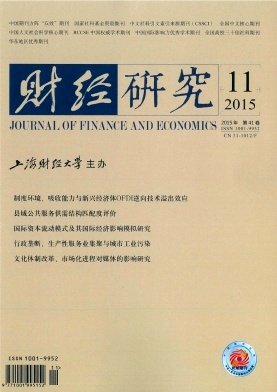财政刺激、信念波动与企业过度投资——基于管理者视角的经验研究
财经研究 2015 年 第 41 卷第 11 期, 页码:44 - 57
摘要
参考文献
摘要
文章结合行为财务的研究成果,基于管理者视角探讨了信念波动在财政刺激与企业过度投资行为之间的中介效应,以及不同特征的企业对财政刺激资金效应与信号效应路径的选择性反应。研究发现,财政刺激政策的实施与退出造成了管理者信念和异质信念的波动,较强的管理者信念和异质信念均加剧了企业的过度投资行为;管理者信念在财政刺激与企业过度投资行为之间存在中介效应,异质信念的中介效应则不明显。进一步研究发现,国有企业、规模较大和破产风险较大的企业对财政刺激所产生的资金冲击的反应更加明显,而民营企业、规模较大和破产风险较小企业的管理者信念的中介效应更加显著。以上结果说明,财政刺激政策同时通过资金效应与信号效应影响企业投资效率,这为完善政策制定、提高施政水平提供了有益的借鉴。
[1] 毕晓方, 张俊民, 李海英.产业政策、管理者过度自信与企业流动性风险[J].会计研究, 2015, (3):57-63.
[2] 郝颖, 刘星, 林朝南.我国上市公司高管人员过度自信与投资决策的实证研究[J].中国管理科学, 2005, (5):144-150.
[3] 贾俊雪, 郭庆旺.财政支出类型、财政政策作用机理与最优财政货币政策规则[J].世界经济, 2012, (11):3-30.
[4] 陆正飞, 韩非池.宏观经济政策如何影响公司现金持有的经济效应?——基于产品市场和资本市场两重角度的研究[J].管理世界, 2013, (6):43-60.
[5] 马健, 刘志新, 张力健.异质信念、融资决策与投资收益[J].管理科学学报, 2013, (1):59-73.
[6] 张其仔, 郭朝先, 白玫.协调保增长与转变经济增长方式关系的产业政策研究[J].中国工业经济, 2009, (3):29-39.
[7] Bayar O, Chemmanur T J, Liu M H. A theory of equity carve-outs and negative stub values under heterogeneous beliefs[J]. Journal of Financial Economics, 2011, 100(3): 616-638.
[8] Biddle G C, Hilary G, Verdi R S. How does financial reporting quality relate to investment efficiency?[J]. Journal of Accounting and Economics, 2009, 48(2-3): 112-131.
[9] Bloom N, Bond S, Van R J. Uncertainty and investment dynamics[J]. Review of Economic Studies, 2007, 74(2): 391-415.
[10] Camerer C, Lovallo D. Overconfidence and excess entry: An experimental approach[J]. American Economic Review, 1999, 89(1): 306-318.
[11] Chen H, Joslin S, Tran N K. Rare disasters and risk sharing with heterogeneous beliefs[J]. Review of Financial Studies, 2012, 25(7): 2189-2224.
[12] Cova P, Pisani M, Rebucci A. Macroeconomic effects of China's fiscal stimulus[R]. IDB Working Paper No. 72, 2010.
[13] Dittmar A, Thakor A. Why do firms issue equity?[J]. Journal of Finance, 2007, 62(1): 1-54.
[14] Hong H, Stein J C. Disagreement and the stock market[J]. Journal of Economic Perspectives, 2007, 21(2): 109-128.
[15] Johansson A C, Feng X. The state advance, the private sector retreats: Firm effects of China's great stimulus program[R]. Working Paper, 2013.
[16] Malmendier U, Tate G. CEO overconfidence and corporate investment[J]. Journal of Finance, 2005, 60(6): 2661-2700.
[17] Richardson S. Over-investment of free cash flow[J]. Review of Accounting Studies, 2006, 11(2-3): 159-189.
[2] 郝颖, 刘星, 林朝南.我国上市公司高管人员过度自信与投资决策的实证研究[J].中国管理科学, 2005, (5):144-150.
[3] 贾俊雪, 郭庆旺.财政支出类型、财政政策作用机理与最优财政货币政策规则[J].世界经济, 2012, (11):3-30.
[4] 陆正飞, 韩非池.宏观经济政策如何影响公司现金持有的经济效应?——基于产品市场和资本市场两重角度的研究[J].管理世界, 2013, (6):43-60.
[5] 马健, 刘志新, 张力健.异质信念、融资决策与投资收益[J].管理科学学报, 2013, (1):59-73.
[6] 张其仔, 郭朝先, 白玫.协调保增长与转变经济增长方式关系的产业政策研究[J].中国工业经济, 2009, (3):29-39.
[7] Bayar O, Chemmanur T J, Liu M H. A theory of equity carve-outs and negative stub values under heterogeneous beliefs[J]. Journal of Financial Economics, 2011, 100(3): 616-638.
[8] Biddle G C, Hilary G, Verdi R S. How does financial reporting quality relate to investment efficiency?[J]. Journal of Accounting and Economics, 2009, 48(2-3): 112-131.
[9] Bloom N, Bond S, Van R J. Uncertainty and investment dynamics[J]. Review of Economic Studies, 2007, 74(2): 391-415.
[10] Camerer C, Lovallo D. Overconfidence and excess entry: An experimental approach[J]. American Economic Review, 1999, 89(1): 306-318.
[11] Chen H, Joslin S, Tran N K. Rare disasters and risk sharing with heterogeneous beliefs[J]. Review of Financial Studies, 2012, 25(7): 2189-2224.
[12] Cova P, Pisani M, Rebucci A. Macroeconomic effects of China's fiscal stimulus[R]. IDB Working Paper No. 72, 2010.
[13] Dittmar A, Thakor A. Why do firms issue equity?[J]. Journal of Finance, 2007, 62(1): 1-54.
[14] Hong H, Stein J C. Disagreement and the stock market[J]. Journal of Economic Perspectives, 2007, 21(2): 109-128.
[15] Johansson A C, Feng X. The state advance, the private sector retreats: Firm effects of China's great stimulus program[R]. Working Paper, 2013.
[16] Malmendier U, Tate G. CEO overconfidence and corporate investment[J]. Journal of Finance, 2005, 60(6): 2661-2700.
[17] Richardson S. Over-investment of free cash flow[J]. Review of Accounting Studies, 2006, 11(2-3): 159-189.
引用本文
张超, 刘星, 田梦可. 财政刺激、信念波动与企业过度投资——基于管理者视角的经验研究[J]. 财经研究, 2015, 41(11): 44–57.
导出参考文献,格式为:





 8250
8250  5059
5059

